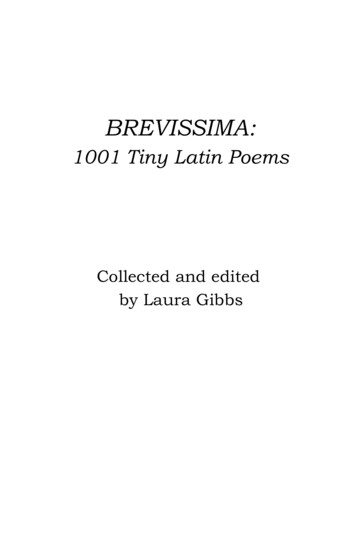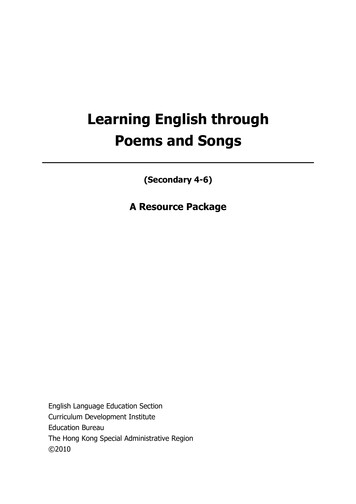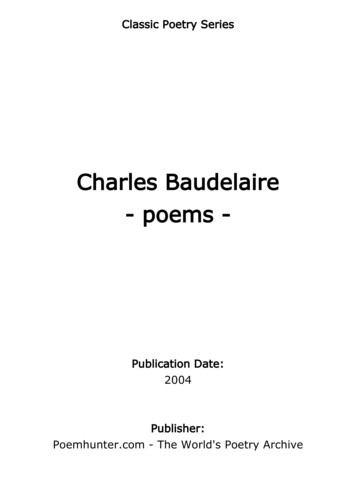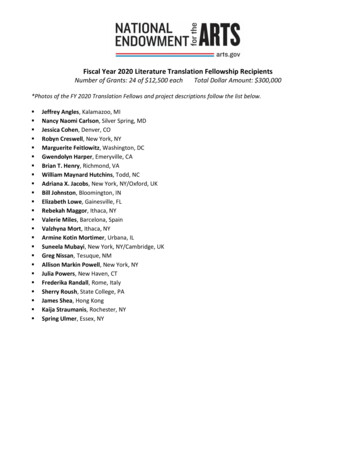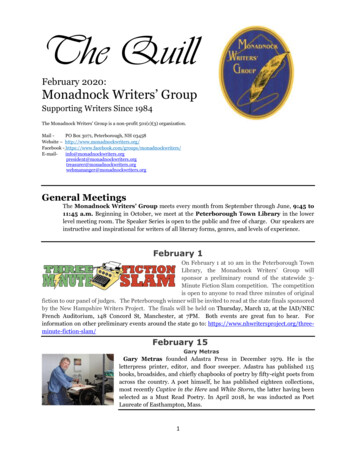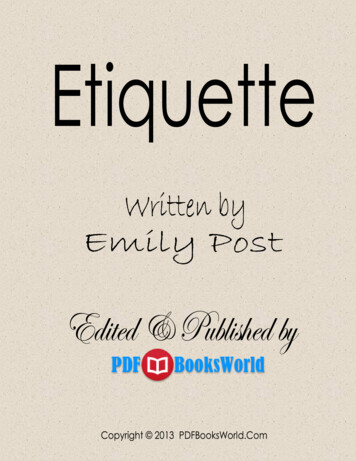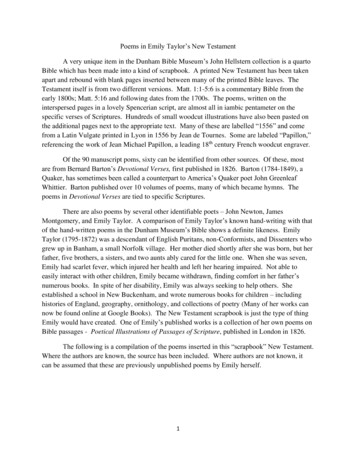
Transcription
Poems in Emily Taylor’s New TestamentA very unique item in the Dunham Bible Museum’s John Hellstern collection is a quartoBible which has been made into a kind of scrapbook. A printed New Testament has been takenapart and rebound with blank pages inserted between many of the printed Bible leaves. TheTestament itself is from two different versions. Matt. 1:1-5:6 is a commentary Bible from theearly 1800s; Matt. 5:16 and following dates from the 1700s. The poems, written on theinterspersed pages in a lovely Spencerian script, are almost all in iambic pentameter on thespecific verses of Scriptures. Hundreds of small woodcut illustrations have also been pasted onthe additional pages next to the appropriate text. Many of these are labelled “1556” and comefrom a Latin Vulgate printed in Lyon in 1556 by Jean de Tournes. Some are labeled “Papillon,”referencing the work of Jean Michael Papillon, a leading 18th century French woodcut engraver.Of the 90 manuscript poms, sixty can be identified from other sources. Of these, mostare from Bernard Barton’s Devotional Verses, first published in 1826. Barton (1784-1849), aQuaker, has sometimes been called a counterpart to America’s Quaker poet John GreenleafWhittier. Barton published over 10 volumes of poems, many of which became hymns. Thepoems in Devotional Verses are tied to specific Scriptures.There are also poems by several other identifiable poets – John Newton, JamesMontgomery, and Emily Taylor. A comparison of Emily Taylor’s known hand-writing with thatof the hand-written poems in the Dunham Museum’s Bible shows a definite likeness. EmilyTaylor (1795-1872) was a descendant of English Puritans, non-Conformists, and Dissenters whogrew up in Banham, a small Norfolk village. Her mother died shortly after she was born, but herfather, five brothers, a sisters, and two aunts ably cared for the little one. When she was seven,Emily had scarlet fever, which injured her health and left her hearing impaired. Not able toeasily interact with other children, Emily became withdrawn, finding comfort in her father’snumerous books. In spite of her disability, Emily was always seeking to help others. Sheestablished a school in New Buckenham, and wrote numerous books for children – includinghistories of England, geography, ornithology, and collections of poetry (Many of her works cannow be found online at Google Books). The New Testament scrapbook is just the type of thingEmily would have created. One of Emily’s published works is a collection of her own poems onBible passages - Poetical Illustrations of Passages of Scripture, published in London in 1826.The following is a compilation of the poems inserted in this “scrapbook” New Testament.Where the authors are known, the source has been included. Where authors are not known, itcan be assumed that these are previously unpublished poems by Emily herself.1
Hand-written poem in front leaf of Emily Taylor's New Testament –a sample of the numerous hand-written poems interleaved throughout her Bible2
On loose leaf in front:The tender mercy of our Lord,And his long0-suffering grace,The Loving-kindness of his word,We every moment trace.Our bread is given, our water sure,Body and soul sustain’dO may we o the end endure.Till haven itself is gain’d1 Envelop’d in impervious shadesFuturity to man remains;But the All-seeing Eye pervadesAll time and space, and all sustains.Man cannot of to-morrow boat,Nor should on fattering joys presume,Nor sink with fear’s envision’d host,Of woes that may not be his own.II.Whate’er the sacred word reveals,Our faith may rasp with certain hand;“The Lamb of God shall loose the seals,And his unerring counsel stand.”Through ev’ry age, since time began,Mysterious goodness we explore;“His gracious pleasure has been done,”And shall, till time shall be no more.2 Lord, when my spirit drinks her fill,At some good word of thine,Not mighty men, that share the spoil,have joys compared to mine“ Providence,” John Montgomery. The Christian Psalmist; or, Hymns, selected and original,with an introductory essay. Glasgow: Chalmers and Collins, 1825, p. 417 , number 526.2“Future Promises,” The Religious Magazine; Or Sprit of the Foreign Theological Journals andreviews, Vol, 3, January-June 1829, p. 501. from the Evangelical Magazine, with Scripture “My counsel shall stand, and I will do all my pleasure” Isaiah xlvi.10.13
Blest proofs of power and love divine,That meet us in his word!May every deep-felt are of mineBe trusted with the Lord3Matthew 6:6-9Father of all! Who dwell’st above,Thy name be hallowed here;As in those realms of peace and love,Where saints that name revere.Thy Kingdom come; Thy will, alone,Be done by man below;As spirits round thy glorious throne,Their pure obedience show.Give us this day our daily bread; Not merely outward food,But that whereon the soul is fed,The source of heavenly good.Forgive our trespasses, as weIn pardoning love abide;Since none forgiveness win from Thee,Who pardon have denied.And lead us from temptation far;From evil, Lord! restore;For thine the power, the kingdom are,The glory evermore!4“Psalm 119 sixth part,” The Psalms, Hymns, and Spiritual Songs of the Rev. Isaac Watts.Boston: Crocker and Brewster, 1858. Emily opened with “Lord’ rather than Watts’ “And”4by Bernard Barton (1784-1849). The Monthly Review, from January to April 1826, Vol. 1.London: Hurst, Robinson Co., 1826, 444).34
Matthew 6:10 – “Thy kingdom come, Thy will be done in earth, as it is in heaven.”O Thou whose ready lips repeatThe Savior’s words, nor deem’st deceitThe while is lurking in thy heart,Pause, ere their memory shall depart.“Thy will be done!” – and dost thou findIn the deep musings of thy mindNo fear, no hope, no passion there,And darest thou call upon thy GodTo try thee with his chastening rod,And round the wide world steadfast look,And find no ill thou canst not brook?What! Couldst thou see the whirlwind comeTo tear thee from thy cherish’d home?See the strong arm of death embraceThe best beloved of all thy race?See, undeserved, an evil fameAttaint thy long unsullied name?Feel slow consuming sickness breakThy mind, now impotent and weak?Yet not one murmur? – If but one,Thou must not say, “Thy will be done!”No; rather, ere thy spirit dareAdopt the Savior’s fervent prayer,The Savior’s spirit earnest seek,Enduring, patient, firm, and meek.Go, seek of God a heavenly mind,Active, like His – like His, resign’d:Pray that thy very prayer may bringNo hated, no unwelcome thing;Pray, that the will of Haven may beHealth, joy, and all things else to thee;And, thus the work of prayer begun,Thou well may’st say, “Thy will be done.”55Emily Taylor, “Thy Wil Be Done”. Lays for the Sabbath: a collection of religious poetry. Compiled by Emily Taylor,revised with additions by John Pierpont (electronic text). Ann Arbor, MI: U. of MI Humanities Text initiative, 1997.5
Oh, Saviour! Speak peace to my soul,In accents as still as the dawning;For thou art the light of distress,The glorious Star of the morning.Then billows and tempests may rage,With naught but that voice that is cheering,My soul is serene—I am blest,The heav’n of rest is appearing.6 Opposite Matthew 10-11Once more, my humble muse, awake and singThe grace and goodness of thy Saviour’s Thing:Since his thou art, his sacred deeds record.And teach mankind to venerate thy Lord,Show how while tabernacling here below‘Twas his continual blessngs to bestow.He who from heaven came down his life to give,Man’s ruined souls from misery to retrieve;Forgot not while among them to displayHis kind compassion to their tents of clay.He, - tho’ none ever knew or priz’d so wellThe sacred joy that kindred spirits feelWhen, far from earth and all its care’s reclin’dThey sweetly intermingle mind with mind,Did not his converse & his love divine,To the small circle of his friends confine.Nor in retirement prais’d his studious hour,The choicest discovery to the mental prowess!No! Jesus’s was no life of soft repose;He bore, - what he on us enjoins, – the crossOn foot, by day, he went from place to placeA thousand voices and maladies to chase;And in bleak mountains, in the midnight airWhile others slept, his moments spent in prayer.Fatigue & hardship, hunger, cold, & want,He oft endured, nor utter’d one complaint.(O that my soul might hence sample takeTo suffer cheerfully for his dear sake!)Where’in he meant some tongue had cause to praise6Last two stanzas of “Thought’ on Christ’s stilling the Tempest” by M.C., December 1825. Evaneglical Magazineand Missionary Chronicle, Volume 4, 56, 1826.6
His matchless love & condescending grace.No cry of misery ever miss’d his ear,No supplicant receiv’d a look severe. Matthew 12:10-21And lo! Another child of woe appearsWho claims our sympathy and tender cares.See his right hand hang useless by his side,By fierce disease wither’d, shrunk, and dried!Depress’d of means his daily bread to gain,Who now will shelter him, or what maintain?His hapless case we cry is hard indeed!But while we thus commiserate he’s freed:Jesus at once gives both command & power;His arm, he stretches , & is lame no more! Matthew 17:27 – “lest we should offend them, go thou to the sea, and cast an hook, and take up the fishthat first cometh up; and when thou hast opened his mouth, thou shalt find a piece of money: that take,and give unto them for me and thee.”The Romans now rule o’er Judea’s land,And send their annual tribute to demand:So poor is Jesus, tho’ the Lord of all,That not wherewith has he to obey the call!But his broad eye the unmeasur’d deep surveysAnd as the little nature’s path can trace,One fish he sees which just has seized a prey(Useless to him) which will this tribute pay.Him to the shore his silent wish commands,To yield his booty up to Peter’s hand;And thus at once the Romans to appease,And prove himself the monarch of the seas. 7
Matthew 19:30 – “many that are first shall be last; and the last shall be first.”But hark! Whence comes those heart criesWhich almost seem to pierce the vaulted skies?Tis those blind beggars. “David’s son,” they say,“In mercy change our darkness into day!”The crowd rebukes them, but rebuke in vain.The more reproved, the louder they complain.Now Jesus calls, - their quicken’d pulses beat.They quit their garments, - fall beneath his feet.Their eyes he touches, they behold their God,And weep his praises in a rapturous flood. Matthew 21Did Jesus in the garden pray,And Isaac in the field?So may I seek thee on my way,And find – my God reveal’d.7 Blest Book! Surpassing human skillWhat beams of Glory in thee shine?What majesty thy pages fill!What rays of light, What life divine.Down from the highest throne aboveThe richest Blessings in thee flow:And rivers from the sea of loveTo water all the Saints below. Matthew 24:20 “But pray ye that your flight be not in the winter, neither on the sabbath day.”Those who have watch’d the changeful formsOf clods and sunshine, calms and storms,.Unto the Christian pilgrim known,Will often make this prayer their own,Dark hours there are of doubt and fear,With scarce one ray of light to chear,7“Meditation:, from “Hymns for Villagers” by Altiquis. The Evangelical Magazine and Missionary Chronicle, Vol. 29,London: Francis Westley, 1821, 243.8
When hope appears for ever fled,And every holy feeling dead.Hen gourds we rear’d around us die,Wand winter rules o’er earth and sky:‘Till languishing for happier bowers,We wish the dove’s fleet pinions our’s.Yet perilous our flight may be,If at such seasons we could flee;Safer it is t seek, by prayer,The root within, and center there.Hours, too, there are, more blest and bright,When all around, above, seems light;Moments, whose influence can impartA sabbath feeling to the heart .Yet, in such thought-transporting thrill,Wisdom’s safe watch-word is, “Be still!”Dwell deep in faith, rut not to sight,Nor venture on unbidden flight.O Lord! In each extreme we know,Thy will, our only signal, show;In heights, in depths, be Thou our say,In winter, or in sabbath day.8 Matthew 23-24Behold Christ yonder all majestic standEncircled with his chosen little band.Crowds gather round him as he moves along,Come, reader, you and I will join the throng.In such society time takes his flightYielding at once both profit and delight.And happy ill those moment be which moreLead us his name to value and adore.Jesus’s was no life of vast repose,He bore, - what he on s enjoins – the cross.On foot , by day, he went from place to placeA thousand woes and maladies to chase;And in bleak mountains, in the midnight air8“Heights and Depths” from Bernard Barton. Devotional Verses; founded on and illustrative of select texts ofscripture. London: B.J. Holdsworth, 1826, 161-162.9
While others slept his moments spent in prayer.Fatigue & hardships, hunger, cold & wantHe oft endur’d, not utter’d one complaint.(O that my soul might hence example takeTo suffer cheerfully for his dear sake!)Where’in he meant some tongue had cause to praiseHis matchless love & condescending grace.No suppliant receiv’d a look severe;Nor could one child of sorrow e’er complainThat he had sought the Lord, but sought in vain.10
Pictures from last Supper in Emily Taylor's New Testament –a sample of the numerous leaves in the Bible with Biblical woodcuts inserted.11
Mark 2:11-14 Matthew calledBehold him yonder! What a num’rous throngHovers around him as he walks along!Are those the good, - the righteous of the ageWho by those virtues his esteem engage;And to superior worth the honorous onesOf holding converse with their Lord below?Not so – they are a most atrocious band.The very scum and refuge of the land;Their moral neighbors shun them & despiseBut Jesus’s are not merely mortal eyes;With keen survey, the naked heart he reads,And deep within it sees some gracious seeds,Seeds which his spirit planted & will raiseAs signal trophies of all conquering graceTheir penitence he knows, their prayers receives,While others scoff, he pities, & forgivesAnd from eternal death, their souls retrieves,And still the same, he deigns to bear in HeavenThe name which here was in derision given:The name in which ten thousand mercies blessed, Mark 4:28 – “For the earth bringeth forth fruit of herself; first the blade, then the ear, after thatthe full corn in the ear.”Faith must anoint the eye to see;Love the awaken’d heart must warm;Grace must from sin’s dominion free;And growth in grace the saint must form.For by degrees the work of GodIs in the heart of man reveal’d;There, first, conviction’s chast’ning rodThat desert makes a furrow’d field.Prepar’d for culture from on high, There grace divine the seed must sow;And there, uprising to the eye,The blade must first its greenness show.That blade which, warm’d by light and love,Water’d by dews of reverent fear,Aspiring to its source above,12
Shall bear the yet unripen’d ear.And, lastly, must the ear, matur’d,The fulness of its corn possess,Ere in the garner safe secur’dThe Husbandman his toil may bless.Such is the gradual growth of grace;And those who well the work survey.In each successive stage may trace,Abundant cause for such delay.Who can at once deliverance gainFrom all that has enslav’d, enticed?Or hope abruptly to attainThe stature of a man in Christ?9 Mark 5That wreched mania see, in sore distress,A host of raging fiends his soul possess!Driven from his sorrowing friends and tranquil homeHe dwells amid the mansions of the tomb!His naked body dreadful wounds displayWhich his own hands inflict from day to day.The bird of night, as o’er his head she fliesSinks down affrighted at his hideous cries!Who can a case so desperate relieve?What kind physician will assistance give? –One is at hand; - his voice the devils know,And the whole legion fly to deeps below!The poor, possessed to health and peace restoredIn strains of gratitude adores his Lord. 9Bernard Barton, “Progressive growth,” Devotional Verses, 163-16413
Mark 8:34 – “And when he had called the people unto him with his disciples also, he said untothem, Whosoever will come after me, let him deny himself, and take up his cross, and followme.”The terms are set before,The path a Saviour trod;No other can restore theeTo favor with thy God.The way of self-denial.The world’s contemptuous frown,The cross’s fearful trial, Are preludes to the crown.Christ suffer’d these to save thee,Each in its wrst egree;Oh. Let them notout-brave thee,His lowly follower be.Though trustless and unsteady,Thou know’st thy feeble heart,A Saviour’s love is readyAssistance to impart .10 Mark 6:35 – “And when the day was now far spent, his disciples came unto him, and said, Thisis a desert place, and now the time is far passed:”If thou slight His offersThy life is but a breath,Nor can wealth’s richest coffersRedeem thy soul from death! Mark 7:32 – “And they bring unto him one that was deaf, and had an impediment in his speech;and they beseech him to put his hand upon him.”That wretch amidst society alone,Neither his wants nor sorrows can make knownNor is he privileg’d by heaven to proveThe pleasing sounds of friendship & of love!These sad defects the Saviour’s skill supplies,This powerful Ephphratha each string unties: The deaf transported hears his Sacred word! –The dumb proclaims the goodness of the Lord!10Brnard Barton, “The terms of Disciplepship,” Devotional Verses, 165-166.14
Mark 7:25 – “For a certain woman, whose young daughter had an unclean spirit, heard of him,and came and fell at his feet:”What means this woman who so close pursuesTho Jesus seems her prayer to refuse?Bespeaks as nought avails, - she follows still,As of determined to obtain her will:Her daughter has a devil, & she knowsJesus alone can overcome such foes:Herself she sees expos’d to misery,And her repeated cry is “Lord help me!”The Saviour frowns, but still she presses on;He talks of dogs, - herself she owns as one;But humbly pleads she may at least be fed,Dog-like, with crumbs dropt from the children’s bread.What boldness this! Will nothing drive her home?Will she obtain her boon by violence?Her suit must fail! – Christ will not be compell’d.Ah, yes: even he to pleas like these must yield.Her faith succeeds, her daughter is relieved;And her own soul we doubt not, freely sav’dSyrophoenecian! Let me learn of theeA holy, fervid importunity!With steady watchfulness at mercy’s gate,In spite of ev’ry obstacle to wait;Like wrestling Jacob still my suit to pressNor leave my God till he vouchsafes to bless. Mark 9:20 – “And they brought him unto him: and when he saw him, straightway the spirit tarehim; and he fell on the ground, and wallowed foaming.”We turn our eyes, & lo! another stands.Who scarcely less our sympathy demands!Satan; that foe, who first our race beguil’dHas dwelt within him from a little child!Now in the waters cast & now the fire,He lives the constant sport of dev’lish ire!His Father hopes the Saviour can relieve,And prays for faith more firmly to believe.15
With tears he kneels; & supplicates the Lord;Nor begs in vain! Christ gives the well known word,None dare resist, - the fiend, indeed, is fled:But, ah! The mangle child is surely dead!No: - the redeemer takes him by the hand,And crowned with smiling health we see him stand. Mark 9:24 “Lord, I believe, help then mine unbelief.”What prayer can conscious weakness frame,God more delights to bless,Than that which, making faith its aim,Yet mourn its faithfulness?Are there not, Lord, who would believeThe power thy word imparts,Who often would that power receive,With joyful, grateful hearts;But unbelief comes in to blightThy harvest in the soul,And o’er thy holy, heavenly lightThe clouds of doubt to roll?Nor is it strange it should be thus;Inscrutable thy way,Which he whose reason would discuss,But finds an endless maze.To such what prayer can thought accordMore simple, humble, brief?Than crying – “I believe, O Lord!Help thou mine unbelief.”This is that lowly frame of mind,To which thy gracious willThe blessed promise once assign’d,Thy power would yet fulfill:That all is possible to himWho full belief can own;Whose eye, through faith, no longer dim.Is fix’d on Thee alone.1111Bernard Barton, “Aspirations after Faith,” Devotional Verses, 167-168.16
Mark 10:21 “Then Jesus beholding him, loved him, and said unto him, One thing thou lackest,”Oh, ye, who. Like this youth,In spirit have with the Redeemer met,Believe the voice of truth,Pleading in love, “One thing is lacking yet.”12 Mark 11:25 “And when ye stand praying, forgive, if ye have aught against any.”Wait not until prayer be ended,To forgive thy direst foe;With thy prayer be pardon blended,If forgiveness thou wouldst know:From this precept should’st thou start,Thine is not a praying heart.13Mark 13:37 “And what I say unto you, I say unto all, Watch.”Art thou a sinner, from the sleepWhich ends in death awaking?Be rous’d this holy watch to keep,Through grace thy sins forsaking.Have growing light and added powerBeen unto thee extended?Forsake not though thy fortress-tower,Nor deem the watch suspended.Only while the vigilance is thine,Canst thou expect the blessingTheir Lord and Masgter will assigTo pilgrims onward pressing.Art thou a saint, by grace redeem’d,Through Christ’s atoning merit?Be not the watch-word disesteem’d,If life thou woulds’t inherit.The higher ground thou may’st have gain’d,Its counsel more is needed;Nor can thy safety be maintain’d,The watch-tower left unheeded.1213From “One Thing Wanting,” by Bernard Barton, Devotional Verses, 169.From “Prompt Forgiveness Enjoined” by Bernard Barton, Devotional Verses, 179.17
In light or darkness, joy or woe,By good or ill surrounded,Thy hope of conquest o’er each forOn watchfulness I founded.Not in the wisdom, or the mightOf man, - for these will fail thee,When powers of darkness, born of night,In conflict shall assail thee.The watchfulness that slumbers notMust be through grace imparted;By faith an prayer it is begot,And saves the simple-hearted.14 Mark 13Amazing grace! & didst thou Lord submitTo torture & indignity for this;That guilty rebels, ransom’d from the pitMight be exalted to eternal bliss?Thy mighty voice call’d nature into birth;Thy potent arm a thousand worlds sustainAnd could’st thou stoop to grovel on the earthTo save a worm from everlasting pains?When angels sinn’d they fell, unpitied fell,Down to the lowest depths of endless woe’But man to snatch from wrath, despair and hell,The Lord of angels did his throne forego!O sin, accursed sin! What hast thou done?Would any thy detested nature see,Let him contemplate God’s coequal SonBleeding and groaning in gethsemane!Not all the miseries which on earth we feelNor hell, with all its horrors can declareJehovah’s righteous vengeance half as wellAs the dire pangs a Savior suffered here! 14Bernard Barton, “Watchfulness Imperative on All”, Devotional Verses, 172-173.18
Mark 15?To ?and his kind Lord, his treach’rous footsteps bendWith an insidious kiss he marks his prey!His injured Master still salutes him “friend,”And asks why thus he should his life betray.Now the rue rabble, armed with staves and spearsDraw near his sacred person to surroundSudden a ray of Deity appears,And all at once fall prostrate to the ground Not all the miseries which on earth we feelNor hell, with all its horrors can discloseJehovah’s righteous vengeance half so wellAs the dire pangs a Saviour suffer’d here! Luke 5:4 - :”Now when he had left speaking, he said unto Simon, Launch out into the deep, andlet down your nets for a draught.”Thro’ all the night with unremitting care,His followers toil yet not one fish ensnare.The morning dawns, nor catch, nor meal have they.What must support them thro’ the coming day?Their master knows their want; see he is nigh,Their hearts to solace, & their tears to dry!The scaly tenants of the foaming deep,Wak’d by his mighty mandate from their sleep,To the ship’s side in sudden shoals are brought,And he directs the net to find the spot:The fishers cast it, & draught they raise,Which richly all their former toil repays. Luke 7The Roman officer sends froth his friends,And his sick servant to the Lord commends:Then comes himself and urges home his suit,With faith as humble as ‘tis resolute.This suit prevails, - the pitying Saviour givesHis powerful fiat, & the servant lives.19
Luke 8 – Jairus’s daughter raisedNor did our Lord the living only save,The dead he oft call’d from the silent grave.The Jewih ruler’s only daughter layIn languishing estate from day to day;The weeping father to te Saviourfled,But came, alas! too late – the child is dead.The mourners readily mock’d to see him comeAnd ask admittance to the damsel’s room;He bids them all withdraw; then, ent’ring cries,“Tabitha cume” “maid, I say, arise!”The soul revisits its forsaken clay;And the glad parents tar their joy display. Luke 10:20 “Notwithstanding in this rejoice not, that the spirits are subject unto you; but ratherrejoice, because your names are written in heaven.”Rejoice not, or rejoice with awe,That subject spirits own your law;That powers of darkness, wont to beYour masters, - from your presence flee.If such dominion foster pride,With instant danger ‘tis alied;If meekly held, obey the voiceWhich bids you tremblingly rejoice.When call’ to meet your foes in fight,“Tis good to tell your Saviour’s might;For victory grateful thanks may rise,But trust bliss still deeper lies.The joy of heaven is perfect joy,Which fear nor danger can alloy;The purest man on earth can knowFrom love and gratitude must flow.If faith a humble hope supply,Thy name is register’d on high,Though in no robe of triumph lad,Rejoice, and be exceeding glad.20
The power which fallen spirits dread,Which can on serpents, scorpions, tread,Such powers, could we command at will,Yield but the joy of conflict still.This latent perils may allure,The hope of heaven is peaceful, pure;If faith this hope to thee assign,Rejoice in Him who made it thine.15 Luke 11:14 – “And he was casting out a devil, and it was dumb. And it came to pass, when thedevil was gone out, the dumb spake; and the people wondered.”Satanic influence in an awful wayExerted, over this man its awful sway;A firm dominion o’er his breast it keeps,And locks from prayer & praise his trembling lips,But locks in vain: for Jesus has a keyWhich sets his tongue at instant liberty! Here includes poem from Matthew 10, with last two lines additional:On foot, by day, he went from place to placeA thousand voices and maladies to chase;And in bleak mountains, in the midnight airWhile others slept, his moments spent in prayer.Fatigue & hardship, hunger, cold, & want,He oft endured, nor utter’d one complaint.(O that my soul might hence sample takeTo suffer cheerfully for his dear sake!)Where’in he meant some tongue had cause to praiseHis matchless love & condescending grace.No cry of misery ever miss’d his ear,No supplicant receiv’d a look severe.Nor would one child of sorrow e’er complainThat he had sought - Lord, but sought in vain.15“A Christian’s rejoicing” by Bernard Barton, Devotional Verses, 176-177.21
Luke 11-12God is LoveI cannot always trace the wayWhere thou, Almighty One, dost move;But I can always, always say,That God is love, that God is love.When fear her chilling mantle flingsO’er earth, my soul in heaven above,As to her sanctuary, springs,For God is love, for God is love.When mystery clouds my darkened path,I’ll check my dread, my doubts reprove;IN this my soul sweet comfort hath,That God is love, that God is love.Yes, God is love; a thought like thisCan every gloomy thought remove,And turn all tears, all woes, to bliss,For God is love, for God is love.16Luke 15 - Prodigal SonO loveliest picture of the God of love!Still fix mine eye, each lingering doubt remove:If in some darer hour it bleeds to knowHow many hearts he home of rest forego,Give to my view a father meek and mild,A father, springing forth to meet his child,And let me hear, far sounding from on high,The angel’s sympathizing burst of joy.Then stronger than before in love to thee,And deep desire the sin-bound soul to freem’Home let m turnm, adoring, as I lookOn the bright promise of thy holy book,And see inscrib;d on all below, abov,More clearly still, the record – “God is Love.”17 16John Bowring, “God is Love”, in Songs of Gladness, J.E. Gould, 1869, 89.This is the last portion of a lengthier poem on the Prodigal Son, found in Emily Taylor. Poetical Illustrations ofPassages of Scripture. Wellington, Salop: F. Houlston and Son, 1826, 54.1722
Luke 17 – the 10 lepers“Of all these sorrowing men, but oneReturns his debt to pay,For life, for health, for joy, for hope –His brethren – where are they?”O, if that hallow’d voice e’en now,From heaven should ask again –“Where are the thankless souls, redem’dFrom anguish, want, and pain?”How must the man, who round the worldLook’d with a Chritian’s eye,Where’er he turn’d his anxious glance,“Here, Lord,” abas’d, reply!Yea, here, n every haunt of men,How oft must feel it true,That thankless hearts are every where;The grateful – O how few!The vows that oft upon the bedOf sickness rose, the prayerOr life to serve the God of life –Where are they? Tell us where?They that from earth’s dark chambers rais’dOnce more to life upspring,Ah, who, of all those thousand heal’d,Their grateful offerings bring?18 Luke 8:43 – “And a woman having an issue of blood twelve years, which had spent all her livingupon physicians, neither could be healed of any,”Observe that woman pressing to get nearWhose tott’ring limbs will scarce her body bearLong has she pin’d in misery & painAnd on physicians spent wealth in vain;Yet hope long dormant now revives again.So strong he faith is, that she can believeEv’n from his robe she shall a cure receive:A touch that faith confirms, the issue stays,Jesus approves, & she proclaims his praise. 18Last portion of Emily Taylor’s”The Ten Lepers”, as found in her Poetical Illustrations
Poems in Emily Taylor’s New Testament A very unique item in the Dunham Bible Museum’s John Hellstern collection is a quarto Bible which has been made into a kind of scrapbook. A printed New Testament has been taken apart and rebound with blank pag
